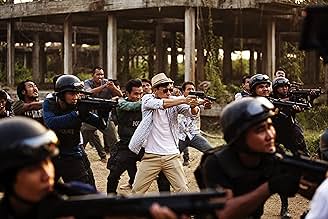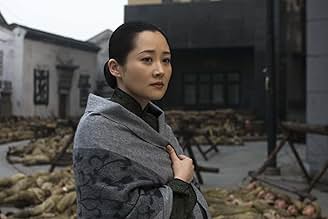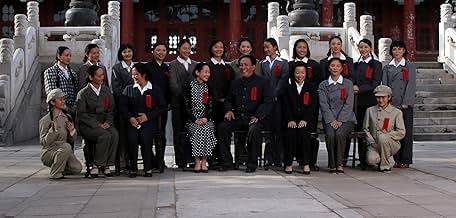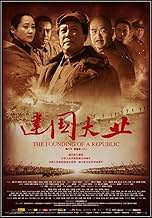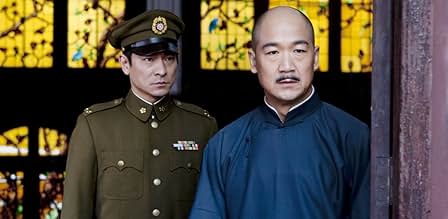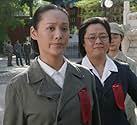Adicionar um enredo no seu idiomaInspired by true events, Founding of a Republic weaves a rousing tale of one man who fought against the tyranny of a ruler and led his people in battle in the ultimate sacrifice for his coun... Ler tudoInspired by true events, Founding of a Republic weaves a rousing tale of one man who fought against the tyranny of a ruler and led his people in battle in the ultimate sacrifice for his country.Inspired by true events, Founding of a Republic weaves a rousing tale of one man who fought against the tyranny of a ruler and led his people in battle in the ultimate sacrifice for his country.
- Direção
- Roteiristas
- Artistas
- Prêmios
- 15 vitórias e 7 indicações no total
- Direção
- Roteiristas
- Elenco e equipe completos
- Produção, bilheteria e muito mais no IMDbPro
Avaliações em destaque
The movie objective is to talk about the foundation of PRC and the film does well, have great actors, its good in their proposal. If you want to see costumes, behaviour of that times see the movie.
* Mao Zedong is portrayed as almost childish at times and as leaving most of the work to Zhou Enlai and others. In fact, he worked hard on a mountain of issues.
* Areas where Mao worked hard were the military campaigns (with Zhu De) and land reform in the newly liberated areas. Yet the movie gives most of its time to maneuvering among the "democratic parties" of the capitalists and intellectuals; the CPC; and the KMT. We hardly see peasants.
These faults in this 2009 movie are a result of Deng Xiaoping's turn to capitalism, reversing the socialist line of Mao Zedong.
(I posted these remarks as a comment on the Youtube page for the movie. They disappeared overnight. Whenever it can, the Chinese government uses the same instant-censorship apparatus around the world that it uses within its borders.)
In much of the propaganda that pervades previous characterizations of Chiang and his Nationalist forces, the Chinese Communists have tended to portray the Chinese civil war as one of black v white, good v evil, with victorious communist forces "liberating" the people from an evil regime. These words still appear today when it is advantageous to Chinese communists' interest. But in this film Chiang seems reflective, fair-minded and concerned over excesses in his own regime--a rather positive image.
Mao is treated to several revisions, appearing jovial, tolerant, and even permissive of some forms of capitalism, the latter something Mao never actually was in his revolutionary days. Indeed, there is little revolutionary fervor in Mao's dialogue in this film, a fervor which in real life permeated Mao's thinking. This seems deliberate, as these ideas would accord little with the current regime in Beijing. In one scene where Mao is shown in an avuncular, loving role with children, even though in real life Mao abandoned his children to pursue his broad revolutionary ambitions.
While KMT excesses are detailed, including several assassinations, there is absolutely no mention of CCP atrocities committed during the Chinese civil war. And, while KMT violations of the interim treaty between the two sides are highlighted, there is no mention of CCP violations of the same pre-civil war accords.
While most of the film is richly detailed in costumes and settings, the special effects are not very realistic, with several airplane scenes being utterly unconvincing as they are obvious CGI. The film is a product of Chinese film makers, but political interests in Beijing factored heavily in its production. I doubt that the movie will generate much interest outside of China.
This film downplays the theme of "ideological struggle" that saturates previous films about the founding of the PRC in place of a dramatized struggle of power between different historical personalities. An extensive list of Chinese entertainment celebrities (from Jet Li to Donny Yen) make 2 minute cameos to portray an equally extensive list of notable Chinese political celebrities from that time period. It's as if someone thought it would be a good idea to adapt the formula for the "Romance of the Three Kingdoms" to the story of the PRC's founding-- except it's not nearly as romantic or interesting.
The film portrays Chang Kai Shak as a conscientious political leader unable to contain the corruption of the KMT and compelled to make choices that dashed any real possibility of a multi-party democratic government in post-WWII China. The filmmakers show him struggling with KMT party members who seek to usurp his presidency and attempting to fight war-profiteering backed by political nepotism, all the while minimizing the actual scope of the corruption in order to market the film to a Taiwanese audience that is probably even more critical of Chang's historical role in this dark chapter of "Chinese history." Meanwhile, Mao is his usual mythologized self--a caring leader, a humble revolutionary, a loving father, a forgiving man, a light-hearted philosopher, and perhaps even a psychic. In one dialogue, Mao is seen emphasizing the need to get help from the "petty bourgeoisie" to rebuild China's war-devastated economy as if predicting (and giving his blessings to) the current free market reforms that began decades later with Deng Xiao Ping.
This is not a film for serious historians and enthusiasts, unless you are looking for an over-budgeted bad comedy. In fact, it's not that different from previous PRC films on the same subject. It's just updated with newer techniques of storytelling for contemporary Chinese film audiences that works in a more subtle way to legitimate the party's current vision of the PRC state. Thus, propaganda version 2.0.
Você sabia?
- CuriosidadesThis movie was made to coincide with the 60th Anniversary of the Chinese Communist Party founding of China. This movie boasts the most number of China's movie stars in one movie. Many of the top stars were invited to star as leads, supporting characters, or just cameo in the movie, reportedly including some of the top Chinese stars like Jackie Chan and Jet Li, who only have one shot or one line in the movie.
- Citações
Li Ji-chen: I heard you intend to resign. Even if you were to resign, at least wait till after the capitulation ceremony in Nanjing. You helped defeat the Japanese. The ceremony can't do without a national hero like you.
Chen Shaokuan: If I don't resign, very soon I'll be blamed for the civil war. We fought against the country's enemy for 8 years. We've struggled, we've fought all, nothing more need be said. And now that we've won, we're still warring. Against whom ? Chinese people fighting Chinese people... this kind of job, I do not want.
Principais escolhas
- How long is The Founding of a Republic?Fornecido pela Alexa
Detalhes
- Data de lançamento
- Países de origem
- Idiomas
- Também conhecido como
- The Founding of a Republic
- Locações de filme
- Empresas de produção
- Consulte mais créditos da empresa na IMDbPro
Bilheteria
- Faturamento bruto mundial
- US$ 1.035.741
- Tempo de duração2 horas 18 minutos
- Cor
- Mixagem de som
- Proporção
- 2.35 : 1
Contribua para esta página


